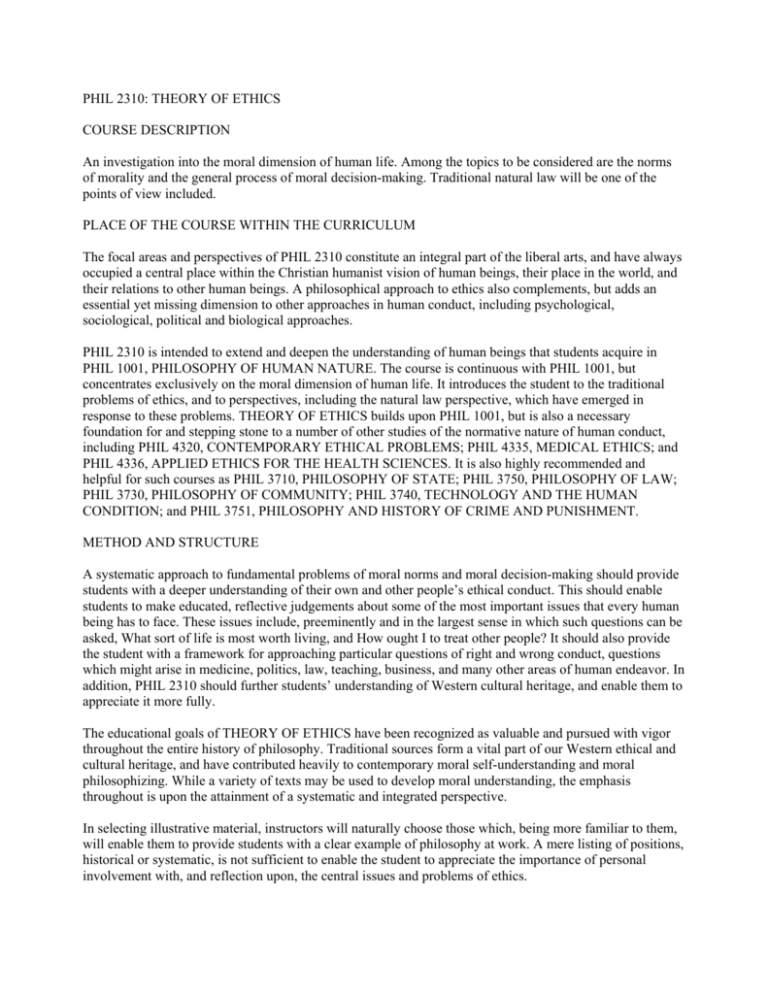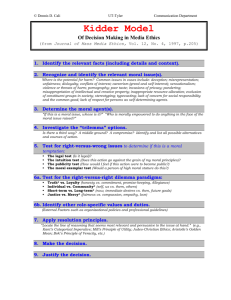PHIL 050: PHILOSOPHY OF HUMAN NATURE
advertisement

PHIL 2310: THEORY OF ETHICS COURSE DESCRIPTION An investigation into the moral dimension of human life. Among the topics to be considered are the norms of morality and the general process of moral decision-making. Traditional natural law will be one of the points of view included. PLACE OF THE COURSE WITHIN THE CURRICULUM The focal areas and perspectives of PHIL 2310 constitute an integral part of the liberal arts, and have always occupied a central place within the Christian humanist vision of human beings, their place in the world, and their relations to other human beings. A philosophical approach to ethics also complements, but adds an essential yet missing dimension to other approaches in human conduct, including psychological, sociological, political and biological approaches. PHIL 2310 is intended to extend and deepen the understanding of human beings that students acquire in PHIL 1001, PHILOSOPHY OF HUMAN NATURE. The course is continuous with PHIL 1001, but concentrates exclusively on the moral dimension of human life. It introduces the student to the traditional problems of ethics, and to perspectives, including the natural law perspective, which have emerged in response to these problems. THEORY OF ETHICS builds upon PHIL 1001, but is also a necessary foundation for and stepping stone to a number of other studies of the normative nature of human conduct, including PHIL 4320, CONTEMPORARY ETHICAL PROBLEMS; PHIL 4335, MEDICAL ETHICS; and PHIL 4336, APPLIED ETHICS FOR THE HEALTH SCIENCES. It is also highly recommended and helpful for such courses as PHIL 3710, PHILOSOPHY OF STATE; PHIL 3750, PHILOSOPHY OF LAW; PHIL 3730, PHILOSOPHY OF COMMUNITY; PHIL 3740, TECHNOLOGY AND THE HUMAN CONDITION; and PHIL 3751, PHILOSOPHY AND HISTORY OF CRIME AND PUNISHMENT. METHOD AND STRUCTURE A systematic approach to fundamental problems of moral norms and moral decision-making should provide students with a deeper understanding of their own and other people’s ethical conduct. This should enable students to make educated, reflective judgements about some of the most important issues that every human being has to face. These issues include, preeminently and in the largest sense in which such questions can be asked, What sort of life is most worth living, and How ought I to treat other people? It should also provide the student with a framework for approaching particular questions of right and wrong conduct, questions which might arise in medicine, politics, law, teaching, business, and many other areas of human endeavor. In addition, PHIL 2310 should further students’ understanding of Western cultural heritage, and enable them to appreciate it more fully. The educational goals of THEORY OF ETHICS have been recognized as valuable and pursued with vigor throughout the entire history of philosophy. Traditional sources form a vital part of our Western ethical and cultural heritage, and have contributed heavily to contemporary moral self-understanding and moral philosophizing. While a variety of texts may be used to develop moral understanding, the emphasis throughout is upon the attainment of a systematic and integrated perspective. In selecting illustrative material, instructors will naturally choose those which, being more familiar to them, will enable them to provide students with a clear example of philosophy at work. A mere listing of positions, historical or systematic, is not sufficient to enable the student to appreciate the importance of personal involvement with, and reflection upon, the central issues and problems of ethics. FURTHER POINTS OF CLARIFICATION “Traditional” refers to philosophers such as Plato, Aristotle, Aquinas, Kant and Mill, and other major figures who have had a major hand in shaping moral philosophy. “Traditional natural law,” which is one perspective taught in THEORY OF ETHICS, is exemplified by the moral philosophy of Aquinas. Natural law systems of ethics refers in general to any system of ethics that grounds ethics on natural inclinations which in the context of Christian theism are instilled in us by God. The “norms” of morality mentioned in the course description should be interpreted broadly, so that they may include not just moral principles and rules, but also moral concepts, moral character traits, moral emotions, moral education, and morally important mental states in general (such as intention). “Moral decisionmaking” refers to the proper methods of arriving at moral choices. Moral norms need not be dealt with independently of moral decision-making, since the two are complementary topics, and questions about the one might well give rise to questions about the other. (Note: Effective Fall 2002, all sections of Phil 2310 are to meet the Ethics “knowledge and skills objectives” for the Human Nature and Ethics knowledge area of the Common Core Curriculum of Marquette University.)






